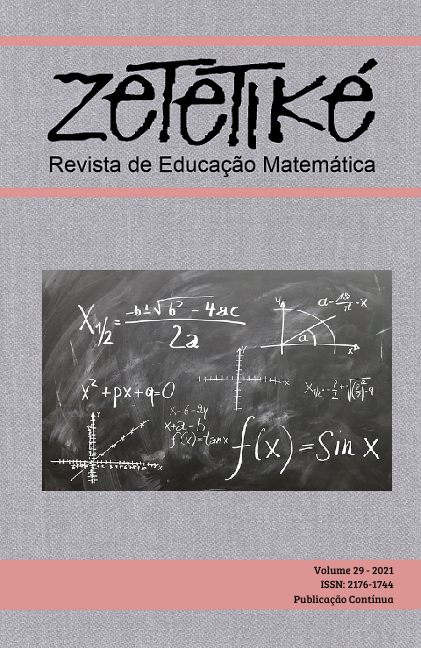Abstract
The purpose of this article is to present a theoretical essay and discuss aspects of a Hypothetical Learning Trajectories (HLT) with the goal to subsidizing the practices of mathematics teachers in pre-service or in-service education. The study is a qualitative research and, in the light of Martin Simon's theoretical assumptions, we seek to argue about the elaboration of HLT as a strategic methodological resource that enables pre-service or in-service teachers to organize their school plans based on hypothetical processing. To achieve these objectives, the following are presented: theoretical aspects of HLT; an HLT on teaching Logarithms; a discussion about the process of its development as a education strategy. As a result, it is inferred that HLTs provide opportunities for teachers education to analyze aspects that delimit their practices in an articulated way, to get involved in a process of reflection and decision-making about their professional practice. The analyzes and reflections are supported by the argument that THA is revealed as a potential resource for teacher training because it has an instrumental, flexible, interactive, predictive, problematic and dynamic character.
References
Angiolin, A. G. (2009). Trajetórias Hipotéticas de Aprendizagem sobre Funções Exponenciais. Dissertação de Mestrado Profissional em Ensino de Matemática. São Paulo: Pontifícia Universidade Católica de São Paulo.
Ball, D. L., & Bass, H. (2003). Toward practice-based theory of mathematical knowledge for teaching. In B. Davis & E. Smith (Eds), Proceedings of the 2002 Annual Meeting of the Canadian Mathematics Education Study Group (pp.3-14). Edmonton. Proceedings… Edmonton: CMESG/GCEDM.
Ball, D., Thames, M. H., & Phelps, G. C (2008). Content Knowledge for Teaching: What make it special? Journal of Teacher Education, 59 (5), 389-407.
Barbosa, A. A. (2009). Trajetórias Hipotéticas de Aprendizagem relacionadas às razões e às funções trigonométricas, visando uma perspectiva construtivista. Dissertação de Mestrado Profissional em Ensino de Matemática. São Paulo: Pontifícia Universidade Católica de São Paulo.
Brousseau, G. (1987). Les differents roles du maitre. Colloque des P.E.N. Angers. In S. A. Martin (Ed.), Reconstructing mathematics pedagogy from a constructivist perspective. Washington, DC: National Science Foundation.
Gómez, P., González, M. J., & Lupiáñez, J. L (2007). Adapting the Hypothetical Learning Trajectory Notion to Secondary Preservice Teacher Training. Chipre: Universidade de Chipre.
Ivars, P., Fernández, C., Llinares, S., & Choy, B. H. (2018). Enhancing Noticing: Using a Hypothetical Learning Trajectory to Improve Pre-service Primary Teachers’ Professional Discourse. Eurasia Journal of Mathematics, Science and Technology Education, 14(11), em1599. doi.org/10.29333/ejmste/93421
Lima, P. O. (2009). Uma Trajetória Hipotética de Aprendizagem sobre Funções Logarítmicas. Dissertação de Mestrado Profissional em Ensino de Matemática. São Paulo: Pontifícia Universidade Católica de São Paulo.
Luna, M. F. A. (2009). Estudo das Trajetórias Hipotéticas de Aprendizagem de Geometria Espacial para o Ensino Médio na perspectiva construtivista. Dissertação de Mestrado Profissional em Ensino de Matemática. São Paulo: Pontifícia Universidade Católica de São Paulo.
Menotti, R. M. (2014). Frações e suas operações: Resolução de Problemas em uma Trajetória Hipotética de Aprendizagem. Dissertação de Mestrado Profissional em Matemática. Londrina: Universidade Estadual de Londrina.
Mesquita, M. A. N. (2009). Ensinar e Aprender funções polinomiais do 2° grau no Ensino Médio: construindo trajetórias. Dissertação de Mestrado Profissional em Ensino de Matemática. São Paulo: Pontifícia Universidade Católica de São Paulo.
Oliveira, J. C. R (2015). Uma Trajetória Hipotética de Aprendizagem para o Ensino de Logaritmos na Perspectiva da Resolução de Problemas. Dissertação de Mestrado Profissional em Matemática em Rede Nacional. Universidade Estadual de Londrina, Londrina.
Oliveira, J. C. R., Frias, R. T., & Omodei, L. B. C. (2014). Uma Trajetória Hipotética de Aprendizagem para o Ensino de Função Afim em um curso de Formação Continuada. Anais do Encontro Paranaense de Educação Matemática. Campo Mourão: Unespar.
Onuchic, L. R., & Allevato, N. S.G. (2011). Pesquisa em Resolução de Problemas: caminhos, avanços e novas perspectivas. BOLEMA - Boletim de Educação Matemática, 25 (41), 73-98.. Disponível em: http://www.redalyc.org/pdf/2912/291223514005.pdf. Acesso em: 15 jan. 2015.
Pires, C. M. C (2009). Perspectivas construtivistas e organizações curriculares: um encontro com as formulações de Martin Simon. Educação Matemática Pesquisa, 11 (1), 145-166.
Polya, G.(1994). A Arte de Resolver Problemas. Rio de Janeiro: Interciência.
Rosenbaum, L. S. (2010). Uma Trajetória Hipotética de Aprendizagem sobre funções trigonométricas numa perspectiva construtivista. Dissertação de Mestrado Profissional em Ensino de Matemática. São Paulo: Pontifícia Universidade Católica de São Paulo.
Simon, M. A (1995). Reconstructing Mathematics Pedagogy from a Constructivist Perspective. Journal for research in Mathematics Education, 26 (2), 114-145.
Simon, M. A., & Tzur, R. (2004). Explicating the role of mathematical tasks in conceptual learning: an elaboration of the hypothetical learning trajectory. Mathematical Thinking and Learning, 6 (2), 91-104.
Steffe, L. P. (2004) On the Construction of Learning Trajectories of Children: The Case of Commensurate Fractions. Mathematical Thinking and Learning, 6 (2), 129-162.
Sztajn, P., Confrey, J., Wilson, P. H., & Edgington, C. (2012). Learning Trajectory Based Instruction: Toward a Theory of Teaching. Educational Researcher, 41(5), 147–156.
Wilson, P. H., Sztajn, P., Edgington, C., & Confrey, J. (2014). Teachers’ use of their mathematical knowledge for teaching in learning a mathematics learning trajectory. Journal of Mathematics Teacher Education. 17, 149-175. DOI 10.1007/s10857-013-9256-1
Wilson, P. H., Sztajn, P., Edgington, C., Webb, J., & Myers, M. (2017). Changes in Teachers’ Discourse About Students in a Professional Development on Learning Trajectories. American Educational Research Journal, 54(3), 568-604. DOI 10.3102/0002831217693801

This work is licensed under a Creative Commons Attribution-NonCommercial-NoDerivatives 4.0 International License.
Copyright (c) 2021 Zeteiké


